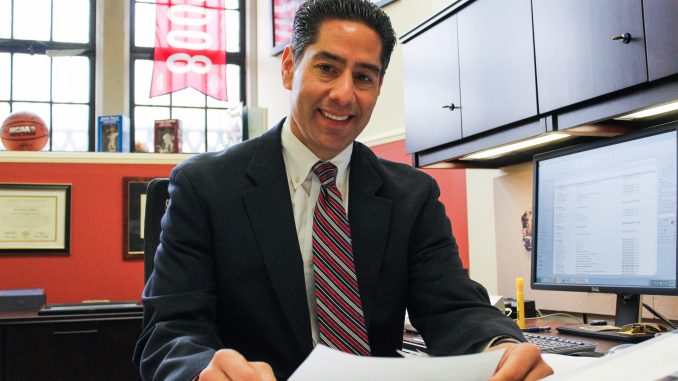
Starting next month, the university will begin to determine changes to Temple’s current budget model for the fiscal year 2019.
This review has been ongoing since Spring 2017 and aims to determine whether the current budget system, which was implemented three years ago, is working for all of Temple’s schools and colleges.
But what is the budget system, why did it change and what’s going to happen next? Here’s what you need to know about the budget review.
THE BUDGET CHANGE
Before the budget changed in 2015, Temple operated on an “expenditure-based model,” said Ken Kaiser, the university’s chief financial officer and treasurer. This means that every school was annually allocated a fixed amount of money by the university to fund everything from programs to faculty salaries.
Funding would be distributed by the Board of Trustees, and often the deans from Temple’s 17 schools and colleges would need to ask the Board to fund new programs or to hire new faculty.
The schools and colleges received money based on enrollment in credit hours, meaning they would receive funding for every class a student took that was offered by the school, even if the student wasn’t directly a part of that college, said Jaison Kurichi, the associate vice president of budget and finance.
“Budgets were very static,” Kaiser said. “It didn’t matter if a school was performing really well or really poorly. Their budgets didn’t generally go up a lot or go down a lot.”
The expenditure-based budget was easier to maintain in prior years because the university was receiving more funding from the state.
Six years ago, the state legislature approved a 19 percent cut to Temple’s funding, dropping it from $172 million to $139 million. Since then, the university has gained back several million dollars, and for the past three years, Temple has received about $150 million from the state.
In 2010, the CFO’s office and the Board of Trustees began to discuss a new budget model that would be more sustainable before the first budget cuts went into effect, Kaiser said.
The new budget idea was a decentralized model called a Responsibility Centered Management budget, or RCM. The model put the deans of the schools in charge of everything. They determine where to spend the school’s money, like on programs or employee compensation. But they also have to generate some funds on their own through student enrollment and donations.
“We, central administration, would have to make funding decisions and move money from one school to another, which generally isn’t well received by deans and so forth,” Kaiser said. “[With RCM], it’s up to the deans. They’re the master of the universe.”
REVIEW PROCESS AND RESULTS
Part of the transition to RCM meant the university would complete a review after reaching three years of the new budget.
During Spring 2017, Deloitte, a company that provides audit, consulting, tax and advisory services, surveyed faculty and administrators to learn what was working about RCM.
According to the review and analysis the university released, nearly 47 percent of the 2,384 full-time faculty and administrators responded to an online survey that asked them to review transparency and involvement with the budget and to evaluate how well RCM fulfilled its mission.
The review’s key findings outlined an increased level of transparency, but that the process was complicated. Faculty members also reported difficulty accessing and assessing data due to staffing and training shortages.
About 53 percent of survey respondents said they don’t know how their school or college prioritizes what should be funded.
The survey also asked respondents to rank RCM’s ability to stick to its “founding, guiding principles,” like fairness and simplicity, on a scale of 1 to 5.
These principles also include things like making the school mission-driven, encouraging entrepreneurship and innovation and holding the people in charge accountable for decisions. While none of the rankings dipped below a 2.5 out of 5, none were higher than a 3 out of 5.
Kaiser said his office plans to help schools consolidate the process for determining budgets by creating committees of faculty members to advise deans when allocating funds. He said the review highlighted a need to simplify the budgeting process, make data more accessible and help schools better understand what RCM is and how it works.
“If we didn’t go to RCM, students would definitely, in my opinion, have been negatively affected,” Kaiser said. “We would just be whistling past a graveyard and watching resources melt away without taking proactive steps to make sure that we preserve and grow resources without just increasing tuition.”



Be the first to comment